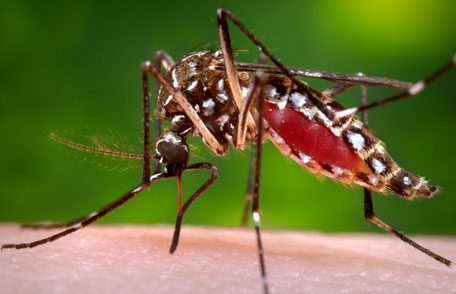By COLE REIF
Great Bend Post
The Kansas Department of Health and Environment has reported unprecedented numbers of Culex species mosquitoes, those that most commonly transmit West Nile virus in Kansas, this year.
Since 2017, three counties (Reno, Sedgwick, and Shawnee) have acted as sentinel sites for WNV surveillance. Five adult mosquito traps are set in each county one night per week from mid-May through the end of September. All three counties have documented a substantial increase in Culex spp. mosquitoes over the last several weeks. The risk of infections to humans, and horses, increases with higher temperatures. In a typical year most human infections with WNV occurred in mid-June through the end of September.
To inform public health, emergency management, and residents, the Kansas Biological Survey, in collaboration with KDHE, began mosquito surveillance on July 3, 2019 in all 67 counties under a Federal or Local Disaster Declaration due to the May floods.
Barton County has an elevated number of both the Culex and Non-Culex mosquitoes in their trap that was tested the first week in July. It is recommended that mosquito control efforts be increased so to protect the public against exposure to Vector-borne illnesses:
Source Reduction
Empty standing water from tarps, old tires, buckets, and other places where rainwater collects.
Refresh water for bird baths, pet bowls, and wading pools at least every three days.
Use larvicide in areas where water cannot be removed. Larvae
Control
Larval source reduction is the single most effective means of vector control.
Larvicides target larvae in the breeding habitat before they mature into adult mosquitos and should be the first line of defense when controlling floodwater mosquitoes.
Larvicides can be purchased at home improvement, farm supply stores, or through pesticide distributors. Look for products containing Bacillus thuringiensis israelensis as this bacterium has no toxicity to people or animals and is approved for use for pest control in organic farming operations.
Adult Control
Adulticide should be used when deemed necessary, according to data gathered in surveillance activities or in response to public health needs.
When adult mosquito populations become too large to be managed by larvicide, adulticide spraying may be considered.
Questions can be directed to the KDHE Epidemiology Hotline at 1-877-427-7317 or [email protected].
Currently, the state does not have funds to pay for mosquito control. More information on surveillance and mosquito control can be found under the resources section of the KDHE Arboviral Disease website: http://www.kdheks.gov/epi/arboviral_disease.htm.
